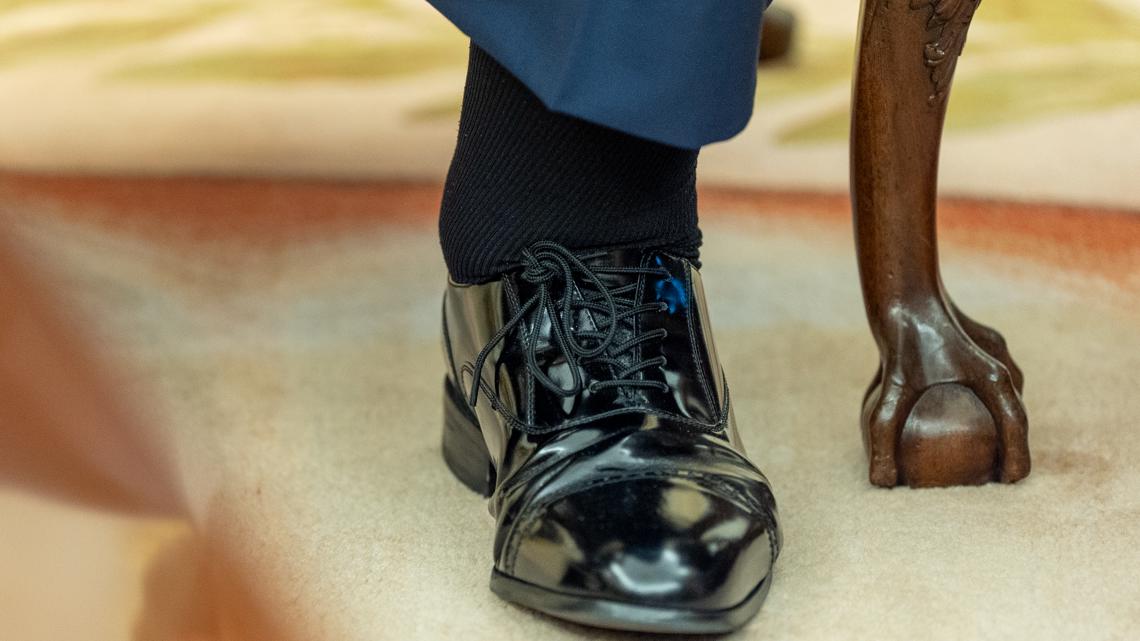Share this @internewscast.com
The condition is fairly common in adults over the age of 70.
WASHINGTON — After observing “mild swelling” in his lower legs, President Donald Trump recently underwent a medical examination and was diagnosed with a condition frequently found in older adults that causes blood to accumulate in the veins, according to a statement from the White House on Thursday.
Press secretary Karoline Leavitt explained that tests conducted by the White House medical unit revealed Trump has chronic venous insufficiency. This condition arises when the small valves inside the veins, which typically assist in moving blood against gravity, gradually lose their effectiveness.
Leavitt also commented on the bruising visible on the back of Trump’s hand in recent photographs, which had been concealed with makeup not quite matching his skin tone. She mentioned that the bruising was “consistent” with the irritation caused by his “frequent handshaking and the use of aspirin.” Trump regularly takes aspirin to lower the risk of heart attack and stroke.
She said during her press briefing that her disclosure of Trump’s medical checkup was meant to dispel recent speculation about the 79-year-old president’s health. Nonetheless, the announcement was notable given that the Republican president has routinely kept secret basic facts about his health.


Trump in April had a comprehensive physical exam with more than a dozen medical specialists. The three-page report released then by the White House did not include a finding of chronic venous insufficiency. At the time, Trump’s doctor, Sean Barbabella, determined that the president’s joints and muscles had a full range of motion, with normal blood flow and no swelling.
Leavitt did not say when Trump first noticed the swelling in his lower legs. As part of the president’s routine medical care and out of an “abundance of caution,” she said he had a “comprehensive exam” that included vascular, lower extremity and ultrasound testing.
She noted that chronic venous insufficiency is a benign condition that is common in people over age 70.
She said the tests revealed no evidence of deep vein thrombosis, a more serious medical condition in which a blood clot forms in one or more of the deep veins in the body, usually in the legs. Nor was there any evidence of arterial disease, she said, reading a letter from Barbabella.
People often are advised to lose weight, walk for exercise and elevate their legs periodically, and some may be advised to wear compression stockings. Severe cases over time can lead to complications including lower leg sores called ulcers. Blood clots are one cause, but was ruled out, Leavitt said.
Leavitt said the condition wasn’t causing the president any discomfort. She wouldn’t discuss how he was treating the condition and suggested those details would be in the doctor’s letter, which was later released to the public. But the letter was the same as what she read, and it did not include any additional details.
Dr. Anahita Dua, a vascular surgeon at Mass General Brigham who has never treated Trump, said there is no cure for chronic venous insufficiency.
“The vast majority of people, probably including our president, have a mild to moderate form of it,” Dua said.
People with the condition can reduce the swelling by wearing medical-grade compression socks or stockings, to help the blood circulate back to the heart, or by walking, she said.
The exam the White House disclosed Thursday included other testing that found no signs of heart failure, renal impairment or systemic illness in Trump, Leavitt said.
“The president remains in excellent health, which I think all of you witness on a daily basis here,” she told reporters.
Copyright 2025 Associated Press. All rights reserved. This material may not be published, broadcast, rewritten, or redistributed.

















